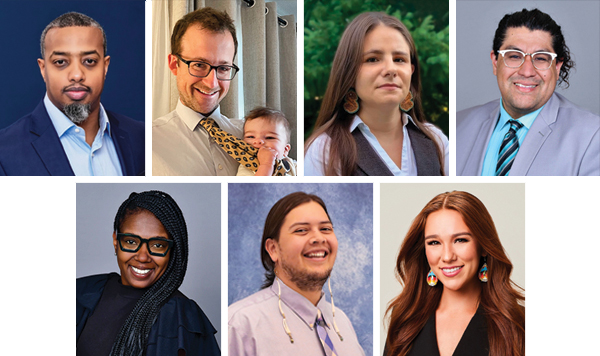Mitchell Hamline School of Law is committed to protecting human rights and promoting equity and peak performance in higher education: helping future lawyers become skilled, global-minded, and culturally intelligent professionals
We are committed to protecting human rights and promoting equity so that we can provide a learning and working environment that maximizes the potential of each of our students, faculty, and staff members. We also embrace Minnesota and Federal laws that prohibit discrimination in education and employment.
The Office of Culture and Inclusion works with the Mitchell Hamline administration, faculty, and staff to create an environment where students feel comfortable expressing their racial, ethnic, gender, national origin, sexual orientation, gender identity, gender expression, religion, and all other dimensions of their social and cultural identity. We offer a number of programs and services that help students build a vibrant learning community, as well as explore the law from different perspectives.
Students welcoming students
We asked some of our 2025–26 student affinity group leaders to share a welcome greeting to our incoming class.
Minnesota law prohibits discrimination in higher education
The Minnesota Human Rights Act (MHRA) is the primary law in Minnesota that prohibits discrimination. It is enforced by the Minnesota Department of Human Rights (MDHR), and it is one of the strongest civil rights laws in the country.
The MHRA prohibits discrimination in education, employment, housing, public accommodations, public services, credit, and business based on protected classes, such as: race, religion, disability, national origin, sex, marital status, familial status, age, sexual orientation, and gender identity.
Spefically related to education, it is an unfair discriminatory practice to discriminate in any manner in the full utilization of or benefit from any educational institution, or the services rendered thereby to any person because of race, color, creed, religion, national origin, sex, gender identity, age, marital status, status with regard to public assistance, sexual orientation, or disability, or to fail to ensure physical and program access for disabled persons. Minn. Stat. § 363A.13(1)
In addition, an academy, college, elementary or secondary school, extension courses, kindergarten, nursery school, business school, or professional school cannot refuse to select for admission or provide education to certain individuals, deny the person the full utilization and benefit of an educational institution, refuse to reasonably accommodate an individual with a disability, or exclude, discipline or expel certain individuals in violation of the MHRA.
Federal laws prohibit discrimination in higher education
Title VI of the Civil Rights Act of 1964 prohibits discrimination on the basis of race, color, or national origin in programs and activities receiving Federal financial assistance. Specifically, Title VI provides that “no person in the United States shall, on the ground of race, color, or national origin, be excluded from participation in, be denied the benefits of, or be subjected to discrimination under any program or activity receiving Federal financial assistance” (42 U.S.C. Section 2000d).
All public colleges, universities and law schools plus virtually all private colleges and universities are covered by Title VI because they receive such assistance by participating in federal student aid programs.
As the US Supreme Court recently confirmed, Title VI prohibits racial classifications that would violate the Equal Protection Clause of the Constitution. All educational institutions, including pre-K, elementary, and secondary public schools and school districts, and public and private colleges, universities, and other postsecondary institutions that receive federal financial assistance, are required to comply with Title VI.
Discrimination based on race, color, or national origin includes discrimination based on a person’s actual or perceived race, color, or national origin. In addition, discrimination may arise based on the country or world region from which a person or their ancestors come; a person’s limited English proficiency or status as an English learner, or a person’s actual or perceived shared ancestry or ethnic characteristics, including those associated with membership in a specific religion (such as Hinduism, Judaism, Islam, or Sikhism).
Discrimination based on a person’s sex is prohibited under Title IX of the Education Amendments Act of 1972. Section 504 of the Rehabilitation Act of 1990 and Title II of the Americans With Disabilities Act of 1975 prohibits discrimination based on a person’s disability, and the Age Discrimination Act of 1975 prohibits discrimination based on a person’s age.
Mitchell Hamline’s commitment to human rights
Mitchell Hamline is committed to fulfilling the promise of Brown v. Broad of Education and its progeny by ensuring that no person is excluded from participation in or denied the benefits of Mitchell Hamline’s educational programs or services on the basis of actual or perceived race, color, creed, religion, national origin, sex/gender, gender identity, gender expression, marital status, familial (or parental) status, disability, status with regard to public assistance, sexual orientation, age, family care leave status, or veteran status, or any other protected class defined by law.
If you feel you are being denied participation in or being denied benefits of the educational programs or services provided by Mitchell Hamline School of Law, or otherwise being discriminated against based on any of the above, please contact the Office of Culture and Inclusion.
Culture and Inclusion at Mitchell Hamline
We believe that multiplicity, in all of its forms, benefits the classroom, the college, and the legal profession. Mitchell Hamline is a welcoming and respectful community where individuals can explore differences in a safe and positive environment, and where students not only learn from their professors but also from the diverse life experiences of their classmates.
Mitchell Hamline pledges to become an antiracist school
Mitchell Hamline School of Law is pledging to work toward becoming an antiracist law school, with the passage of a resolution approved last week by faculty. The resolution commits the school to several actions to “identify and eliminate racism that exists at our school, in the legal profession, and in the judicial system.” Those actions … Continue reading Mitchell Hamline pledges to become an antiracist school
From the Docket
See AllCulture & Inclusion credit requirement
Mitchell Hamline students matriculating in Fall 2016 or later are required to attend at least six total hours of extracurricular culture and inclusion programming. Of the six total hours required before graduation, at least four hours must be completed in the student’s 1L and/or 2L year.
- Approved Culture & Inclusion Programming
- Approval Request for Outside Events & Programs
- Submit an Affidavit of Completion
- Student Event Programming Guidelines
- Faculty Student Organization Advisor Guidelines


